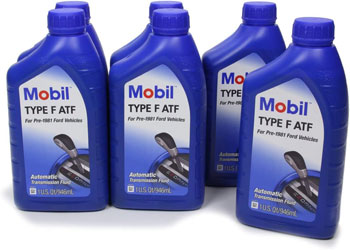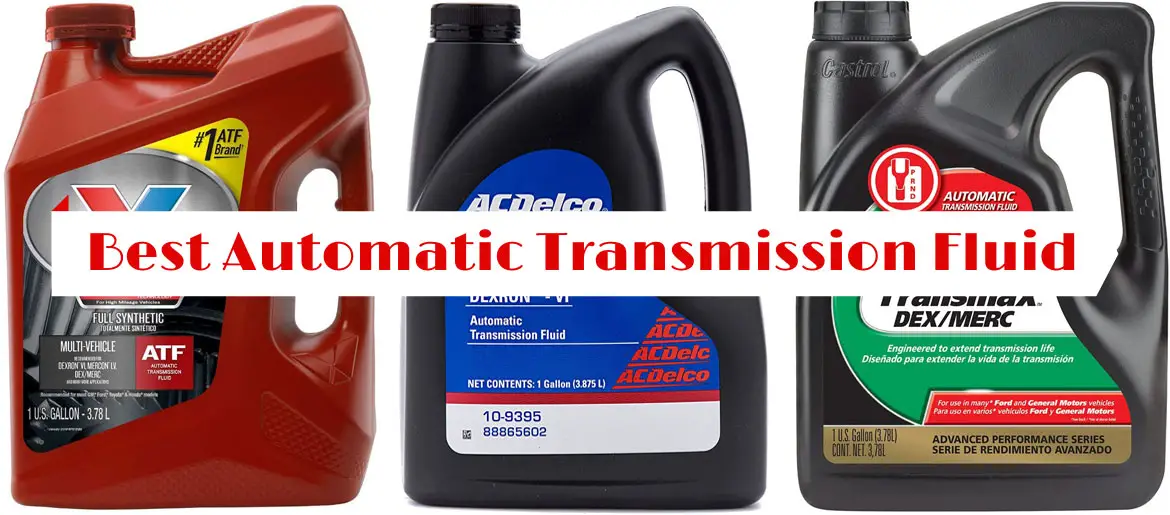5 Best Type F Transmission Fluid 2024
Reviewed By: Joses Peter
Ever find yourself wondering why your automatic car reminds you of a circus while running and cornering? It’s probably because your car is making a weird whining/buzzing noise while being idle and roaring when cornering.
These are common indicators of low transmission fluid in your car. Not changing this transmission fluid may result in a disaster.
So, how do you rectify this problem? That’s where I come in, more precisely, our post on the 5 best type F transmission fluid.
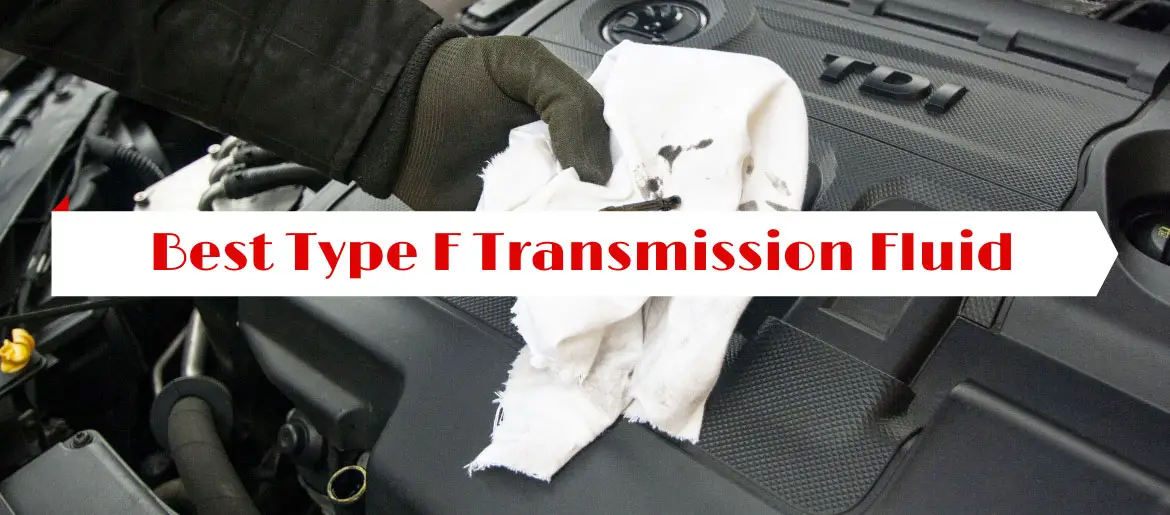
Down below, I’ve provided a list of the top 5 F-type transmission fluids available on the market right now. I’ve also provided important information regarding how and when to change your transmission fluids.
This will further hone your knowledge regarding transmission fluids. Ultimately enabling you to choose the right fit for your car and how to take care of it.
That being said, let’s begin-
- Quick Comparison of Top 5 Type F Automatic Transmission Fluids
- Castrol 6816 Transmax Type F ATF
- Valvoline Type F (ATF) Automatic Transmission Fluid
- Genuine Ford Fluid XT-1-QF Type-F Automatic Transmission and Power Steering Fluid
- Mobil 1 – Type F Automatic Transmission Fluid
- ACDelco GM Original Equipment 10-9395 Dexron VI Automatic Transmission Fluid
- Types Of Fluids
- Vehicle Compatibility
- When To Change ATF?
- How To Change Transmission Fluids?
- What Transmission Fluid is Compatible with Type F?
- What is Different About Type F Transmission Fluid?
- Is Mercon V the Same as Type F?
- Is Type F Fluid Synthetic?
- Can You Use Dexron in Place of Type F?”
- How many types of Transmission Fluids are there?
- Which type of transmission oil has the greatest longevity?
- Is it possible to start a car even with faulty transmission fluid?
Quick Comparison of Top 5 Type F Automatic Transmission Fluids
| IMAGE | PRODUCT | DETAILS | PRICE |
|---|---|---|---|
★ OUR #1 PICK! ★ Castrol 6816 Transmax Type F ATF |
|
||
Valvoline Type F (ATF) |
|
||
Genuine Ford Fluid XT-1-QF Type-F |
|
||
Mobil 1 – Type F ATF |
|
||
ACDelco GM Original Equipment 10-9395 Dexron VI |
|
Reviews of 5 Best Type F Transmission Fluids
Castrol 6816 Transmax Type F ATF
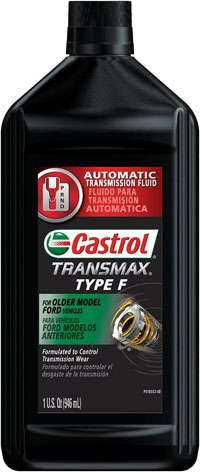
First, in the list, I have Castrol’s Transmax 6816, and this is our number one pick on the list. So why don’t you take a closer look as to why it’s ranked so high on the list?
For starters, the Castrol Transmax was designed for older Type F or Ford vehicles. This Ford type F transmission fluid works particularly well for Ford-Type Models before 1982.
Also, the Castrol Transmax 6816 covers the unique characteristics required for these Ford Type Transmissions.
Other than that, the 6816 also has outstanding lubrication characteristics which means it has excellent handling capabilities. Using the Castrol Transmax means that you’ll minimize the shifting lags, and shifting with gears would be smoother now.
On the other hand, the Castrol also has excellent longevity and allows your component to remain in top shape. This is due to its excellent thermal and oxidation characteristics.
Its bushings also allow it to have optimized transmission operation.
Pros
- Decent Thermal Stability.
- Works well on older models.
- Excellent shift quality.
- Provides long-lasting protection.
- On the inexpensive spectrum of things.
Cons
- Doesn’t minimize vibration.
- Requires time to have the best use.
Valvoline Type F (ATF) Automatic Transmission Fluid
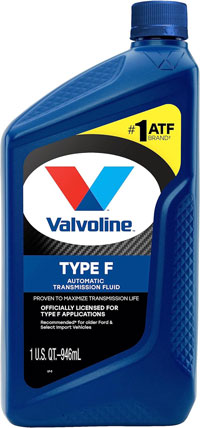
Next up I have a “Valvoline Type F transmission fluid”, coming in at a second place. The Valvoline brand is a pretty well-known brand in the world of transmission fluids.
So it’s no surprise as to why this ATF ranks so high on the list. That said, what makes it so special?
For starters, the Valvoline was made using a proprietary blend of base oils and complex additive packages. This allows for this oil to have excellent oil flow in colder environments and greater film protection at higher temperatures.
As for its durability factor, the Valvoline has been engineered with anti-wear technology which allows it to have one of the best transmission durability.
You’d think that the Valvoline would have subpar performance in the shifting department as it focuses on thermal stability. However, you’d be wrong, as the Valvoline is made with advanced anti-shudder protection for better and smooth shifting performance.
Pros
- Excellent Thermal Stability.
- Good shifting performance.
- Provides decent durability.
Cons
- Doesn’t help with noise reduction.
Genuine Ford Fluid XT-1-QF Type-F Automatic Transmission and Power Steering Fluid
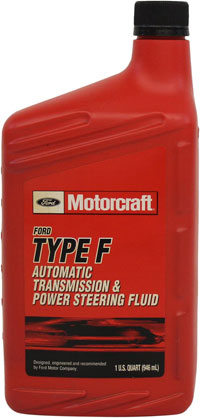
Coming in at number three on the list is the Ford XT-1. This is one’s a bit unique in its characteristics as it is a Power-steering type of ATF. This officially ends the top 3 race on our list of top Type-F transmission fluids.
So what earned Ford’s XT-1 the coveted spot on the list? Let’s find out-
For starters, the XT-1 has the lowest viscosity of all the ATF fluids on the list. A lower viscosity means it has a better flowing characteristic than others.
Its lower viscosity is also responsible for its adaptability. This makes it applicable for not only Ford cars but also farm equipment and other industrial vehicles.
Ford’s ATF fluid specializes in all models except the newer models on the market. More specifically, the models that use “MERCON LV”, “MERCON V”, and “MERCON SP ATF fluids”.
Along with all of this, the Ford XT-1 also provides excellent rust, corrosion, wear-and-tear protection. This ATF also resists foaming.
Pros
- Works on different automobile types.
- Has a low viscosity.
- Resists rust and corrosion.
Cons
- The shifting performance is not great.
- Doesn’t support newer models.
Mobil 1 – Type F Automatic Transmission Fluid
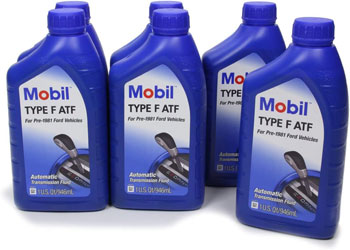
Next up, I have number 4 on the list. This is a pretty well-known brand too, in the world of ATF fluids so it’s no surprise why it made it on the list. This is Mobil 1’s ATF fluid for Type F transmissions.
For starters, the Mobil 1 comes in a pack of 6, with one quart each. So essentially you get a 6-quart deal for an affordable price.
The Mobil 1 is the most consistent and dependable automatic transmission fluid of the 5 on the list. This is an important characteristic when it comes to modern ATF fluids.
Generally, most fluids take some time to get used to the transmission line. This causes the car to have low initial performance regarding vibration, noise and shifting of the transmission.
However, with Mobil 1 this doesn’t seem to be the issue. It will give a consistent performance throughout its lifetime.
It also has decent durability and can support cars predating 1981 models.
Pros
- Supports older models.
- Decent durability.
- Provides consistent performance.
Cons
- Low shifting performance.
- Low thermal stability.
ACDelco GM Original Equipment 10-9395 Dexron VI Automatic Transmission Fluid
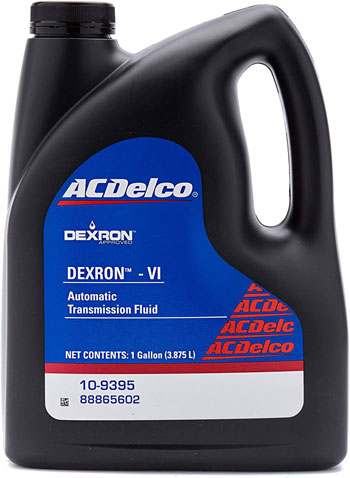
Last but not least, I have the ACDelco Original Dexron ATF fluid. Now, this is the last name on our list, but don’t underestimate this one. This ATF fluid did beat quite a few worthy competitors to get the last spot on the list.
The ACDelco is the only backward-compatible ATF fluid, on the list. This means that the ACDelco supports all other vehicles that support Dexron ATF fluid preceding this model.
This is a very handy characteristic if you’re a collector of old cars as older cars use a different ATF fluid.
The ACDelco is also boasts enhanced fluid durability and viscous stability. Along with all these the ACDelco also provides excellent foam control and aeration along with sublime oxidation resistance.
ACDelco is also one of the most consistently performing ATFs on the list (second only to Mobil 1). This means that it has stable shifting performance even in the most extreme of conditions.
Pros
- Backward Compatible with Older models.
- Excellent Foam-Control.
- Decent Durability.
- Stable Shifting performance.
Cons
- It is a bit pricey.
How to Choose The Best Type F Transmission Fluid?
This section focuses on how you might choose the best Type-F Fluid. To set things straight, there is no “best” Type-F transmission fluid.
It all depends on the type of car you have, more precisely, what fluid suits it better. I’ve mentioned a few factors below that you need to think about before choosing a fluid.
Types Of Fluids
Now there are a lot of different types of transmission fluid available on the market. However, there can be two broad categories when it comes to fluids. These include synthetic and traditional fluids.
Let’s go over these two a bit more in detail,
So, let’s begin with the synthetic type F transmission fluid. As the name suggests synthetic type f fluids have man-made chemicals in them. These friction modifiers additives help the fluid to last longer.
This is done by making the fluid more heat stable, so the Trans fluids can last longer in more extreme conditions. These don’t breakdown that easily and stay longer with the transmission system as a result
This is why synthetic type F transmission fluids are far more common in newer models.
But due to the added longevity of the synthetic base oils, it sacrifices one aspect. That is the price, synthetic transmission fluids are far more expensive than traditional ones.
This brings us to the second type of Trany fluids, the traditional type f transmission fluids. These are mainly used in older models and do not have any synthetic components added to them. This makes these fluids less heat resistant and more prone to breaking down.
However, this also means that they are on the inexpensive side of things. Traditional or Conventional types f transmission fluids should only be chosen if the car is of an older model.
Vehicle Compatibility
The next thing limiting your choice of the best type of transmission fluid is compatibility. For you to use a fluid it has to be compatible with your car’s make in the first place.
Some fluids are universally compatible also known as multi-type F ATF, which means they can be used for a wide range of vehicle types. You should always check whether or not these fluids are backward compatible with your car.
These types of fluids can particularly be helpful if you have a wide range of vehicles in your garage. This way you’d save a fortune by choosing one single fluid for all your vehicles.
However, be warned when choosing a transmission fluid that promises to support all of your automobiles.
Be sure to check the owner’s manual for each of your vehicles to see if that specific type of fluid is supported by the transmission system.
What is Type F Transmission Fluid?
I’ve already talked about how to choose the appropriate type f transmission fluid for your car. But I haven’t gone over what a type F transmission fluid is.
So, what is the type F transmission fluid anyway?
Type-F transmission fluids are conventional-type fluids. These fluids were made for Ford-type automotive.
The original Ford Type F fluid was designed to improve clutch controls, by lowering clutch slippage and rapid clutch engagement. This was made using reduced friction modifiers, however, it is safe not to use this in newer models.
It’s safer for you to use modified ATFs for Ford models after the 2000s and the traditional Type F for models preceding that. Otherwise, compatibility issues may result in your transmission system being shoddy.
Mercon III and Mercon V fluid of Ford Motor Company could be used as a type f transmission fluid equivalent if you’re running out of options.
How And When to Change Type F Transmission Fluid?
Some of the audience members may be wondering how and when to change your Tranny fluids. Don’t worry, this section clears that doubt up.
When To Change ATF?
For starters, there is no clear-cut rule as to when one might change his/her ATF. A lot of factors determine how you can tell when to change your fluid. The number one indicator is the color and any outward symptoms of faulty transmission fluids.
Your car might leak fluid, make whizzing sounds while being idle, etc. All of these are tell-tale signs of getting your transmission fluid checked.
If your fluid is slightly darker in color and has debris in it. You should change your transmission ASAP.
Other factors like what vehicles use type f transmission fluid may play a hand. Generally, it is recommended that you change your transmission fluid between every 60,000 and 100,000 miles for Automatic Transmission.
This is because type F is typically used for Automatic cars.
For manual cars, it is recommended that you change it every 30,000 to 60,000 miles.
How To Change Type-F Transmission Fluids?
After you’ve established that you’re in a dire need of a Transmission Fluid change, let’s talk about the specifics of how to do that. Down below I’ve provided a step-by-step guideline on how to change your transmission fluids.
Following our instructions will allow for a proper transmission drain and better gear shifting. So let’s begin-
Step 1: Elevate
Before you do anything you need to raise your car. You can do this using carjacks or even a ramp. Make sure to do this on a flat surface as you need your car to be as level as possible.
This will allow you to slide underneath the car and access the transmission panel.
Step 2: Locate And Prepare For Extraction
Next, locate the fluid pan. For Front-wheel drive cars the pan is usually located at the left-to-right side of the engine bay’s underside. For rear-wheel-drive cars the pan is facing front-to-rear, hanging underneath the center console area.
Now, your fluid pan may or may not have a draining plug, at the center of the pan. You have to unscrew this part using a socket-wrench or hex key.
However, if you’re unlucky, you might have to drain the pan by unscrewing the bolts to the side of the pan. In which case it’ll be very messy, so I recommend wearing gloves and old clothes.
Remember to place a collecting tray underneath the fluid panel to catch all the fluids.
Note: It will help with collecting the fluid if the collecting tray is bigger than or as big as the transmission panel.
Step 3: Close Up & Measure
Next, close up the draining plug using a socket-wrench or hex key when the fluids start dripping. Make sure to tighten the screw to prevent any leaks.
It’s recommended to pour the old fluid inside an empty quart or liter bottle, to get an exact measurement of the fluid you’ll need to fill back up.
After which, you need to open up your vehicle’s owner’s manual to determine which type f automatic transmission fluid is needed for your vehicle.
Step 4: Fill Up Your Tank
After determining the type of Trans fluid needed for your car, pop the hood of your car. Next, remove the fluid dipstick from the transmission line.
Next, put a funnel on the top of the transmission line and pour in the required amount of transmission fluid. After doing so add the dipstick back into the transmission line.
Step 5: Check & Finish Up
Now that you’ve added the new transmission fluid, turn on your engine and allow the car to run for a few minutes. Remember to check the fluid level as per the dipstick and the owner’s manual’s specifications. Otherwise, you’ll have faulty gear shifts.
People Also Ask
What Transmission Fluid is Compatible with Type F?
There are a variety of fluids that are compatible with Type F transmissions, including Dexron III, Mercon V, and Mercon. These fluids are often used in newer vehicles, and they are all designed to work with a variety of different transmissions.
What is Different About Type F Transmission Fluid?
Type F transmission fluid is a special type of transmission fluid that is designed for use in Ford vehicles. It is not compatible with other types of transmission fluid, and it is important to use the correct type of fluid in your vehicle to avoid damage to the transmission.
Type F transmission fluid has a higher viscosity than other types of transmission fluid, which means it is thicker and will help to protect the transmission from wear and tear. It also has a higher boiling point, which means it can withstand higher temperatures without breaking down.
Is Mercon V the Same as Type F?
In general, they are not the same. Mercon V is a newer, updated version of the Mercon fluid, while Type F is an older version. While they may be similar, they are not exactly the same, so it is important to check your owner’s manual or ask a mechanic before using either one in your vehicle.
Is Type F Fluid Synthetic?
Type F fluid is a synthetic transmission fluid that was introduced in the early 1990s. It was designed to improve the performance of automatic transmissions and is now the most common type of fluid used in cars.
Can You Use Dexron in Place of Type F?”
Yes, In general, Dexron is a type of ATF that can be used in place of Type F, but it is always best to consult with the vehicle’s owner manual or a qualified mechanic to be sure.
How many types of Transmission Fluids are there?
There are mainly two types of transmission fluids, which are either automatic transmission or manual transmission. Newer models typically have ATFs and older models tend to have manual transmission fluids.
Which type of transmission oil has the greatest longevity?
Synthetic Type Transmission oils have an edge over traditional transmission oils. This is due to the Traditional Transmission Oils being comprised of crude oils and the synthetic ones being made through chemical reactions, specifically to make them more durable.
Is it possible to start a car even with faulty transmission fluid?
Yes, it is possible to start a car even with faulty transmission oil or fluid. However, it may start in the wrong gear. You can tell if your car starts in the wrong gear if you can hear the gears grinding. In which case the car will not run for very long or very fast.
Final Words
So, that’s all about the best type F transmission fluid available on the market. I hope that I could help you with your particular predicament with transmission fluids.
If you’re having second thoughts about which one to choose, I recommend you use us. After all, a lot of manhours went into the making of this list. So picking our top pick is a safe choice.
Either way, you are convinced that you’ll make the right choice regarding the matter at hand. I sincerely believe that I have equipped you with the knowledge to pick one for yourself.
Till then take care, and stay safe!

